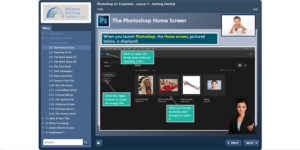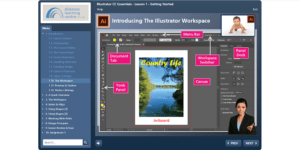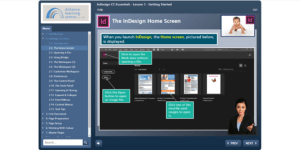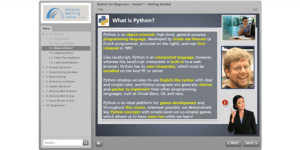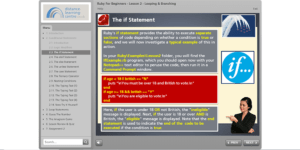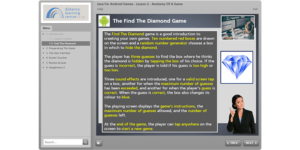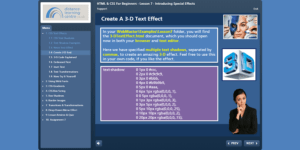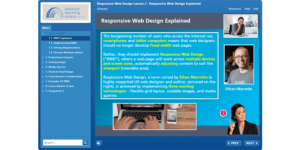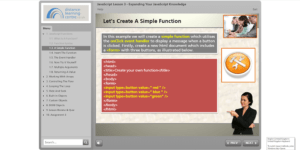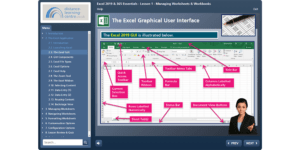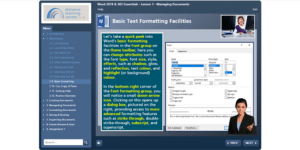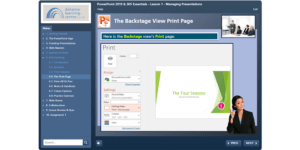Ruby for Beginners – Level 3 Course
The Ruby for Beginners – Level 3 Course teaches this dynamic, open source programming language. Ruby is a cross-platform, object-oriented programming language available for Windows, MacOS, Linux, Unix, and many other operating systems, and is ideally suited to the development interactive applications and games.
Ruby views everything it encounters and interacts with as an object and is an interpreted language, which means it is executed by an interpreter at run-time, allowing you to make changes to your Ruby scripts and then immediately run them without having to go through a compilation process, like so many other programming languages.
We start by demonstrating how to install the Windows version of Ruby and we progress slowly but surely by writing small programs that demonstrate each new concept or technique, moving on to more advanced programs usually in the form of an interesting game. The Ruby interpreter, together with the Gosu graphical gaming library and the Chipmunk physics engine, are available completely free of charge for all major platforms, and can be freely distributed.
On successful completion of the course, students will receive the Distance Learning Centre Python for Beginners Diploma with feedback and analysis of your completed work, as well as an Open Awards Quality Endorsed Unit Course Certificate.
uNITS
The Ruby for Beginners – Level 3 Course includes the following units:
Unit 1: Getting Started
The following topics are covered:
- Introduction;
- Introduction to Ruby;
- Understanding Variables;
- Working with Strings;
- Performing Arithmetic;
- Logical Operations;
- Lesson Review & Quiz;
- Assignment 1 – The Trivia Program.
Unit 2: Looping & Branching
The following topics are covered:
- Introduction;
- Conditional Statements;
- Loop Statements;
- Guess the Number Game;
- The Anagram Game;
- Lesson Review & Quiz;
- Assignment 2 – Guess The Word Game.
Unit 3: Arrays and Hashes
The following topics are covered:
- Introduction;
- Introducing Arrays;
- Working with Arrays;
- Nested Arrays;
- Working with Hashes;
- The Hangman Game;
- Lesson Review & Quiz;
- Assignment 3 – The Anagram Game with Clues.
Unit 4: Working with Methods
The following topics are covered:
- Introduction;
- Creating Methods;
- Parameters & Returns;
- Variables in Methods;
- The Noughts & Crosses Game (1);
- The Noughts & Crosses Game (2);
- Lesson Review & Quiz;
- Assignment 4 – Updating the Hangman Game.
Unit 5: Ruby Files and Folders
The following topics are covered:
- Introduction;
- Directory & File Methods;
- Working with Text Files;
- Handling Exceptions;
- The Sports Quiz;
- Lesson Review & Quiz;
- Assignment 5 – Build Your Own Quiz.
Unit 6: Ruby Objects
The following topics are included:
- Introduction;
- Classes, Methods, & Objects;
- Initializing Objects & Attributes;
- Special Class Methods;
- The Hungry Caterpillar Game;
- Lesson Review & Quiz;
- Assignment 6 – Create A Television Object.
Unit 7: Object-Orientated Programming
The following topics are covered:
- Introduction;
- Creating Multiple Classes;
- Inheritance;
- Changing Inherited Methods;
- Creating Modules;
- The Rock, Paper, Scissors Game;
- Lesson Review & Quiz;
- Assignment 7 – The Highest Card Game.
Unit 8: Ruby GUI Programming
The following topics are covered:
- Introduction;
- Creating A Graphics Window;
- Inserting Text & Images;
- Keyboard & Mouse Input;
- Simple Animation Techniques;
- The “Bash The Ruby” Game;
- Lesson Review & Quiz;
- Assignment 8 – The “Hit The Square” Game.
Unit 9: Game Development Techniques
The following topics are covered:
- Introduction;
- The “Ping Pong” Game;
- Galaxy War Game V1;
- Galaxy War Game V2;
- Galaxy War Game V3;
- Lesson Review & Quiz;
- Assignment 9 – Update The Galaxy War Game.
Unit 10: Advanced Games Development
The following topics are covered:
- Introduction;
- The Twelve Game V1;
- The Twelve Game V2;
- The Twelve Game V3;
- The Escape Game V1;
- The Escape Game V2;
- The Escape Game V3;
- The Escape Game V4;
- Lesson Review & Quiz;
- Assignment 10 – Update the Escape Game.
Key Information
Cost
Course Format
Self-study Time
Delivery Time
Prerequisites
Students should have: a working knowledge of using text editors or word processors; A basic understanding of your computer’s operating system; A working knowledge of your email software and the ability to attach files to an email; A basic knowledge of file zipping software such as WinZip or 7-Zip; and some experience of downloading and installing software packages from the web.
Although Ruby is available for other operating systems as well as Windows, the installation and running instructions are for the Windows operating system. All other software is provided with the course. Installer files for Ruby, the Ruby Development Kit, and Notepad++ are included in the course materials.
Course Duration & Online Support
You can start this course at any time, and you would be registered for a one-year period. You also have access to a personal tutor who can be contacted by email. Your tutor is available to assist with any queries and to mark your assignments for the Awarding Body.
As the course is self-study, you can complete it as quickly as you like. Support extensions are available if students do not complete the course within the one-year period.
Assessment
You will be assessed on the completed assignments contained in the training programme. The coursework will consists of individual practical programming assignments that can be sent to your course tutor by email or by post on completion of your training.
Open Awards Certification
On successful completion of this course students will receive our Ruby for Beginners Diploma with feedback on your work and providing the assignments have been completed to the required standards students will also receive a Level 3 Open Awards Quality Endorsed Unit Course Certificate with 8 Open Awards Credits.
The completion of this course alone does not lead to an Ofqual regulated qualification but may be used as evidence of knowledge and skills towards regulated qualifications in the future. To this end the learning outcomes of the course have been benchmarked at Level 3 against level descriptors published by Ofqual, to indicate the depth of study and level of difficulty involved in successful completion by the learner.
You can find further information on qualifications/certificates and their levels on the Ofqual’s level descriptors page.
The certification is issued through Open Awards. Open Awards are an Awarding Body Organisation approved by Ofqual. Set up in 1981, Open Awards (Previously the North West Region of the National Open College Network – OCNNW) have been in business for over 30 years and are a not for profit organisation and a registered charity.




